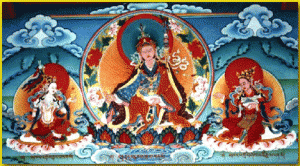
An excerpt from a teaching called Compassion, Love, & Wisdom by Jetsunma Ahkon Lhamo
Practice takes a long period of time. You will be practicing till the end of your life. In order to be successful you must be consistent in your practice, you must keep your commitments, you must cultivate the mind of pure intention, and you must cultivate the purest kind of love to keep the fires burning and to keep yourself motivated. After practicing for a good long period of time the mind itself will change and will become more and more stable. Those momentary feelings or experiences that you have in your meditation will become longer and longer. They will become more and more normal. When they become longer and longer it isn’t just that they become longer and longer in time but they become deeper and wider in their intensity and in their content. They become more a part of the way that your mind naturally functions. The goal of course is for that process to continue, because true realization is not a momentary ‘aha’, true realization is not something that you realize, that is knowledge. True realization is not an experience. That is a ‘something.’ True realization is awakening to the natural state that is free of all conceptualization. The mind needs to become stabilized in that state. How does that happen?
You must practice a technology or a path that causes your mind not to constantly run away with you, not to constantly run after things. It is desire that causes you to run after things. If you have ever tried just sitting and meditating you will discover that at first it is extremely difficult. Actually for a long time it is quite difficult. When you try to think of nothing or you try to remain poised or balanced in that natural state, try to simply let your mind be relaxed and to realize emptiness or to not think of anything, whatever it is that your technique happens to be, pretty soon, as in a split-second, your mind will be running down the block and you have to go run after it to catch up with it. You will find that you have thought of something that bubbled up out of the pool of your mind and that you followed it. You follow it by making all kinds of conclusions from what came up in your mind – judgments, opinions, developments. For instance, perhaps when you first sit down to meditate you may come up with, “Oh I left the coffee pot on.” And then immediately you are going to come up with, “That’s going to stink up the whole kitchen.” Then you are going to come up with, “Then it’s going to boil over.” Then you are going to say, “Well that wasn’t a very good coffee pot anyway, and well I always leave it on, I don’t know why I leave it on, there is something wrong with me, I’m kind of worried about it,” and then, “It’s just like me I sit down to meditate and here I am thinking about the coffee pot. Doggone it, I am not thinking about the coffee pot again.” By the time you find yourself you are in the next county, probably the next city. You are way down the road. That is what will happen in the beginning of your meditation.
When you get a little bit further in your practice you will learn a technique of letting go of those things, of just dropping them. You are not making a judgment about it, but just dropping it. Like if coffee pot comes up you let coffee pot go. You don’t run down the block thinking about coffee pot thinking this about myself and that about myself and this about coffee pot and that about coffee pot. You learn the technique of simply dropping it. Coffee pot comes up and coffee pot goes. The next thing that will begin to happen as you practice is that your mind will say, “Hey, I am not getting away with this anymore so I am going to try harder,” and the talker in your head, the one that never shuts up, is going to pop up and say, “We’ll get dramatic then, I’ll get her attention.” And so it jumps up and says, “Axe murder, Axe murder.”
Well immediately you run away with that thinking, “I thought about an axe murder. I’m not a very spiritual person. I thought about this in my meditation. This meditation is bad for me, but maybe not, maybe there is just something wrong with me.” There again you are off in the next county and of course you have to learn the same technique of dropping the axe murder. When that doesn’t work it will try something even more fun. It will say, “You are really a good person, you’re meditating now.” Or it will say, “You just had a good experience.” And you will think, “Yeah, that was a great experience, if fact I think that was like the nature of emptiness she is talking about because I didn’t think about myself at all for a minute, in fact I’m not thinking about myself at all right now I’m just thinking about that experience that I had.” And then you think about what a nice person you are and that comes up and, “I have not missed my meditation, not once for weeks and weeks now, I am so good I can’t believe it. Can you believe it? I am just so good. I’m so pleased with how this is going. A year ago I never thought this could happen to me, that I could sit here and mediate on emptiness as I am doing now.” Your mind begins to sound a little bit like Lilly Tomlin. You are sort of down the road and that begins to happen.
The techniques the Buddha advises you need to master are those that will eliminate the whole walkie-talkie scene. To eliminate that particular kind of thing you have to learn how to disengage from the desire that causes you constantly to define yourself. What is happening in that kind of state is the thoughts that come up in your mind as a result of your belief in self-nature as being inherently real. They are a result of your need to constantly redefine and cause yourself to be, because you think that is what you are. You are actually shoring up all around yourself. It’s like you take concepts and create a nice receptacle for you to live in so that you understand yourself. There is a funny kind of mechanism that happens when you do that. You really think that is what you are, this receptacle that you have built, this four squared thing that you have built with your bricks of conceptualization. That’s what you think you are. The Buddha teaches us that that isn’t our nature at all. The phenomena that arise within our mind, as well as the phenomena that we experience as external, which are not different from the phenomena that arise within our mind, and the belief in self-nature, these things are all inherently empty. They are puff-balls. I don’t know that Lord Buddha used the word puff-balls, but I think it is a good word. You can argue with me if you want.
© Jetsunma Ahkön Lhamo




